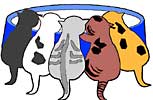|
|
Milk: Polyunsaturated Non Adventures In Paradise
by Marjorie Dorfman
|
There are many people who consider milk a cruel and unhealthy product. There are many others who avoid meat for ethical and/or health reasons and still consider dairy foods nutritious and humane. Cow’s milk is suited to the nutritional needs of calves (surprise!) that, unlike human babies, will double their weight within 47 days of birth, (as opposed to 180 days for humans) and weigh 1,100-1,200 pounds within two years. Cow’s milk contains about three times as much protein as human milk and almost 50 per cent more fat.
According to Dr. John McDougall, in addition to being an unnatural food for humans, cow’s milk, like other dairy products, can be unhealthful. They are, he claims, "liquid meat" because their nutritional contents are so similar. Rich in fat and cholesterol, dairy products, including cheese, milk, butter, cream, yogurt and whey (found in many margarines and baked goods), contribute to the development of heart disease, certain cancers and stroke- our nation’s three deadliest killers. Author Robert Cohen estimates that by the time the average American is 50, he or she will have consumed the same amount of cholesterol from dairy foods as that found in 1 million slices of bacon! Perhaps the most surprising claim of all is that the consumption of dairy foods has also been linked to osteoporosis, the very disease milk is supposed to prevent. Osteoporosis is characterized by low bone mass and deteriorating bone tissue. According to research conducted at Harvard University over a 12-year period, this bone loss is not so much halted or prevented by an increased calcium rate as by a drop in protein consumption. (Everyone involved went to medical school. Who should we believe? I opt for the cows.)

And now a word about the poor cows. At least half of the 10 million cows kept for milk in the United States live on factory farms that cause tremendous suffering to the animals. They do not spend hours grazing in the field as they should, but live in crowded concrete-floored milking pens, where they are milked 2 or 3 times a day by machines which often cause cuts and injuries that would not occur with hand-milking. Cows on today’s farms live about 4 to 5 years as opposed to the life expectancy of 20 to 25 years enjoyed by cows of an earlier era. To maintain high levels of productivity, dairy farmers keep their cows constantly pregnant through artificial insemination.
Perhaps the greatest pain suffered by the cows is the repeated loss of their young. Female calves usually become milk producers, but the males are taken from their mothers within 24 hours of birth and sold at auction. Within 60 days, the cow is impregnated again. For about 7 months of her 9-month pregnancy, the cow will be milked for the fluid meant for her older calf. A typical factory-farmed cow will give birth 3 or 4 times during her short life. When her milk production wanes, she is sent to slaughter, most likely to be ground up into fast food burgers! (Talk about gratitude!)
And so, my friends, perhaps the real truth about milk lies somewhere in between the two schools of thought. Milk is neither perfect, nor is it poison. We must evaluate and do our homework, so to speak. In either case, the question: "Got milk?" needs to be amended. How about "Got soy?" or "What about de udders?"
Did you know . . .
|
|
|
|
 |
|